Everest Base Camp Trek Introduction
The Everest Base Camp Trek is no doubt a bucket-list activity for most people around the globe. While this trek is known for adventure and thrill, the venture goes way beyond it. With adventure, you will experience the mountain lifestyle, get to know the Sherpas and other local communities closely, come across a wide range of flora and fauna, and immerse yourself in the cultural richness of the Everest region.
The trail wanders lush rhododendron forested hills. Cross many suspension bridges on the way and come across lovely waterfalls and streams. Likewise, you will also see stupas, chortens, and monasteries along the trail. With adventure, you will also have cultural experience to some extent during the Everest Base Camp trekking. The locals welcome you with open hearts. Their kindness and hospitality give more character to the Everest base camp trek.
The Everest region is home to many mountains that you can see. You will be literally in the ocean of mountains and hills. Some of the notable snow-capped mountains you get to see along the Everest base camp trekking route are Mt. Everest (8,849 m/29,032 ft), Mt. Lhotse (8,516 m/27,940 ft), Mt. Ama Dablam (6,812 m/22,349 ft), Mt. Thamserku (6,608 m/21,680 ft), Mt. Cho Oyu (8,188 m/26,864 ft), Mt. Nuptse (7,861 m/25,791 ft), Cholatse (6,440 m/21,130 ft), etc.
The 14-day Everest base camp trek demands that you be bold and push your limits. There are many health benefits to this trek, too. You are more likely to lose a few pounds and get fit by the end of the trek. Escape into the wilderness of the Himalayas with our friendly and reliable team. We will make sure you have a safe and memorable Everest base camp trek with us.
Check out our Everest base camp trek route map on the package page for more information about the trail. If you have any questions regarding the trek, you can always text us.
Do not forget: "Everest Base Camp is not the end, but the beginning of a journey to discover the beauty of nature and the strength of the human spirit."
A typical day on the Everest Base Camp Trek
Your day will begin early in the morning. You will have a warm breakfast of your choice and get ready to leave the lodge. The porters will carry the duffel bags. After around 3 hours of trekking, we take a break for lunch and then continue the walk to the next village.
Every day, it will be 5 to 6 hours of the trek at minimum. Our goal is to leave the village where we spent the night by 8:00 AM and reach the next village before 3:00 PM to 4:00 PM. The guide will inform you about the villages you pass by and let you know the names of the mountains along the route.
How's the flight from Kathmandu to Lukla?
Kathmandu Lukla Flight is very famous among travelers because of the small runway and the height of the airport. You will take the Lukla flight from Kathmandu or Ramechhap airport. Spring and autumn seasons are high air traffic seasons, so Lukla flights are operated from Ramechhap Airport, which is located 4 to 5 hours drive from Kathmandu.
Similarly, if the Lukla flight is from Manthali airport, then you will leave the hotel at 2:00 AM to 3:00 AM to reach the airport on time to catch the flight. Manthali airport is located 4 to 5 hours away from Kathmandu.
Do you need a guide for the Everest base camp trek? Can I trek alone?
Without a doubt, you can embark on the Everest base camp alone. But if you ask for our recommendation, then we suggest doing it with a guide because they make the journey much more meaningful and safe.
You will have a friend to rely on in the mountains—someone who knows the Everest region inside and out. You will get to learn a lot about the locals, their lifestyle, and their cultural heritage.
In the peak trekking seasons, when almost all lodges are packed, the guide will make sure you get a comfortable place to spend the night. And nevertheless, they will assure your safety in case of any unforseen circumstances in the Himalayan region.
What is the difficulty of the Everest Base Camp Trek, and what are the possibilities of altitude sickness?
The Everest base camp trek is moderate in terms of physical difficulty level. For every trekker, the difficulty level of the Everest base camp trek can differ depending on their fitness. We say the Everest base camp trek is a moderate-to-difficult trek.
*If you are not sure whether the Everest base camp trek is the right trek for you or not, contact us, and we will help you figure it out.
- Terrain: You will follow uneven, rugged mountainous terrain during the EBC trek. The trail goes through forests and foothills before ascending above treeline and continuing through barren, rocky tracks and glacier moraines. You will frequently ascend and descend throughout the trek.
- Elevation and altitude: Everyday elevation increases during the Everest base camp trek of 14 days. It means there is certainly a risk of altitude sickness during the Everest base camp trekking. During the overall trek, you will gain 5,545 m/18,192 ft. To avoid altitude sickness, you have to keep yourself hydrated and acclimate your body. Our guide will constantly remind you to drink water. If you feel any discomfort, feel free to share it with our guide.
How do I prepare for the Everest Base Camp Trek?
The thing that makes the Everest base camp trek possible for beginner trekkers is preparation. You do not have to do anything in advance to prepare for Everest base camp trekking. Go on a few hikes and do regular long walks to make yourself physically fit.
You can also do cardio training or other activities like swimming, cycling, running, etc. These activities will improve your stamina. Likewise, weight training will also help you.
For packing, follow our Everest base camp trek packing checklist. You can rent or buy heavy or expensive trekking gear in Kathmandu, Nepal. Get your trekking boots early and wear them a few times to get used to the boots. Meet your doctor if you have any medical conditions, and inform us too.
What is the Everest Base Camp trek elevation and altitude profile?
The Everest base camp trek begins at Kathmandu, which is at 1,400 meters (4,600 ft). The starting point of the trail is Lukla at 2,846 m (9,337 ft). Over the next five to six days, the elevation gradually increases and leads you to the Everest base camp, located at 5,364 m/17,598 ft. Kala Patthar at 5,545 m/18,192 ft is the highest point on this trek.
Our Everest base camp trek itinerary has two acclimatization days, which is necessary to avoid altitude sickness. You will spend rest days in Namche Bazaar (3,440 m/11,290 ft) and Dingboche village (4,410 m/14,470 ft). Hike to Hotel Everest View (3,962 m/13,000 ft) and Nagarjuna Hill (5,100 m/16,732 ft), respectively, from these villages.
What is included in the Everest Base Camp Trek Package of spring and autumn 2025/2026?
Our 14-day Everest base camp trek is an all-inclusive package that covers permits, guide/porter expenses, Lukla flights, accommodation/meals, and service charges. This is one of the best Everest base camp trek packages, with ample acclimatization days.
Likewise, our Everest base camp trek cost is also the finest in the market with all the services. You can join us on our Everest base camp trek in 2025/2026. We do not have any hidden costs or policies. For more information, kindly get in touch with our team.
Alternative Everest base camp trek packages and other adventurous treks in Nepal
You can do the Everest base camp trek in Nepal in more ways than you can imagine. We have a wide range of packages for Everest base camp trekking for beginners and experienced trekkers.
Some of our hand-picked packages are the Everest base camp luxury trek, the Everest base camp trek 14 days, the Everest base camp helicopter tour with landing, and the Everest base camp trek with helicopter return.
Similarly, for experienced trekkers, we specifically recommend these packages: Everest base camp and Gokyo Lakes trek, Everest three passes trek, and Island Peak climbing with the EBC trek.
What are the benefits of the Everest Base Camp trek with Nature Excursion?
- Free airport pick-up and drop-off as per the itinerary.
- Get trekking gear like a down jacket and duffel bag for the journey (to be returned at the end of the trek).
- An oximeter and a first-aid kit during the trek.
- Native mountain guides and porters
- Clean rooms and delicious meals.
- Trek certificate and Nature Excursion t-shirt.
- Satellite phone to stay connected with the office team during the trek in the isolated areas.
- Free storage for your additional luggage in Kathmandu.
- In case of an emergency, we will provide you with immediate helicopter evacuation and medical assistance (involving charges payable by your travel insurance company).
- Farewell dinner at the end of the trek.



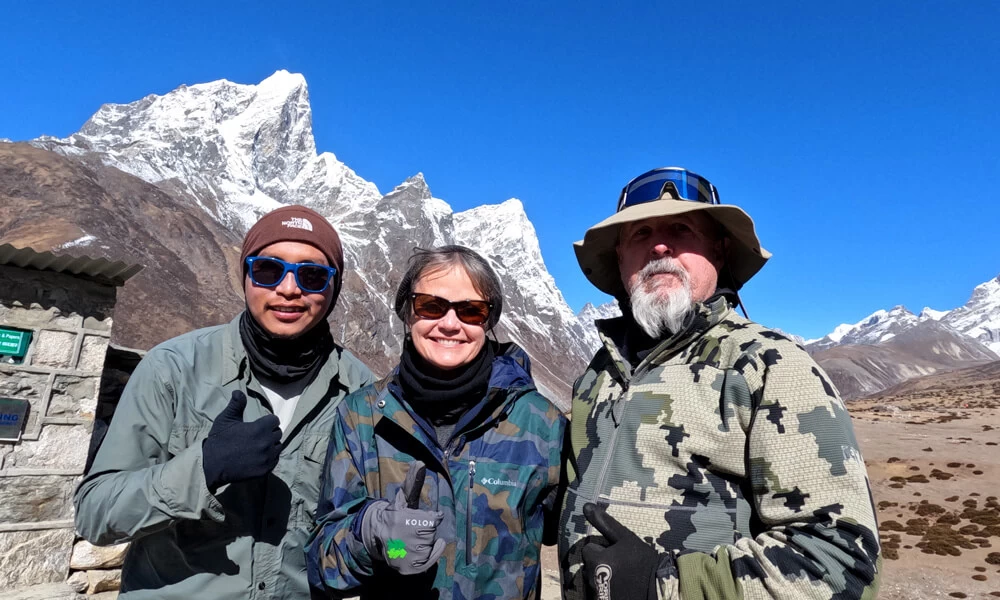
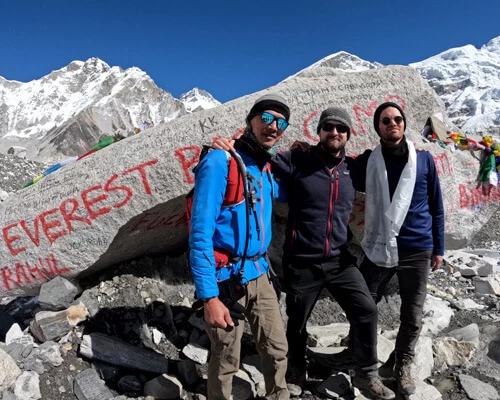
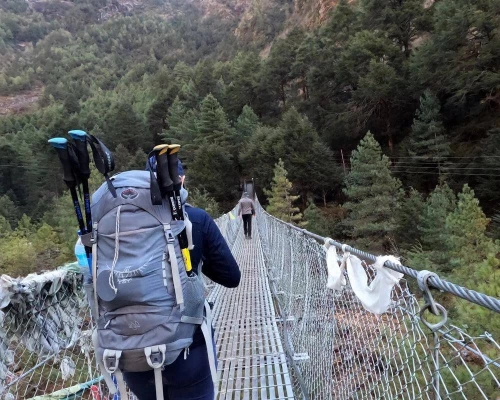
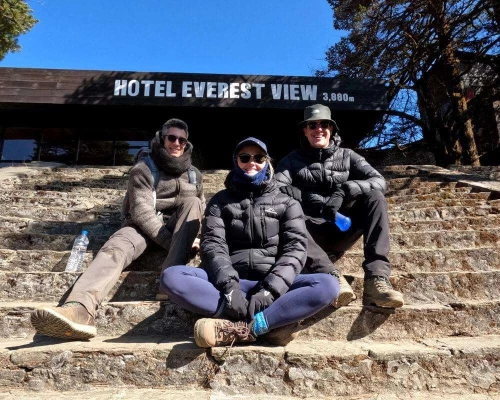
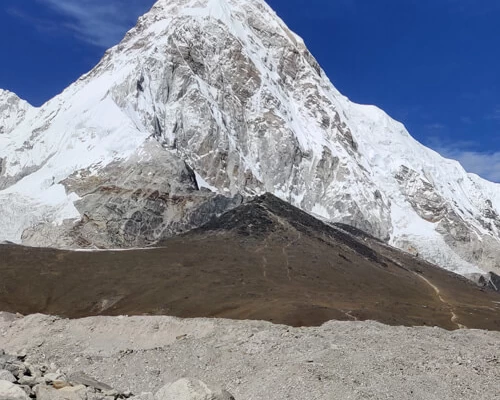

-(1).webp)
-(1).webp)
.webp)
.webp)
.webp)